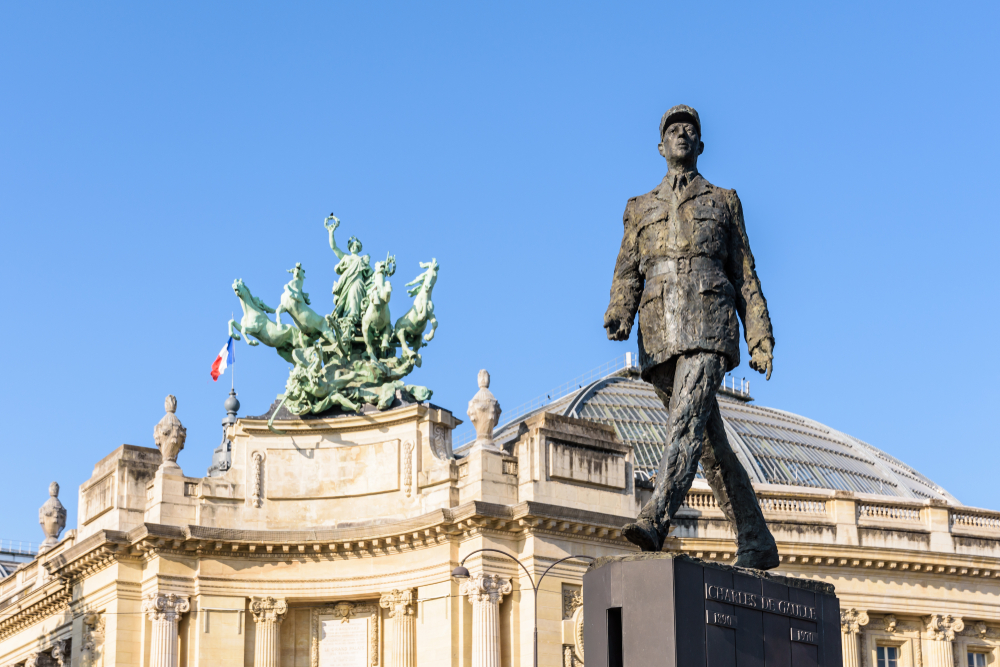
How the French establishment holds power through the electoral system
In several publications on French politics, we have mentioned that the liberals and centrists in the person of Emmanuel Macron, with an average support of 30-35% of the population, won two consecutive presidential elections not thanks to the sympathy of the majority of voters, but thanks to ingenious political technologies that helped to frighten and manipulate the leftist and nationalist opposition. But the liberal establishment’s hold on power was aided not only by clever propaganda moves that produced fictitious chimeras of dangerous “fascism” or “communism”, but also by the quite ordinary legal mechanisms for holding elections laid down in the constitution of the Fifth Republic. If we consider the French presidential elections, they are organized in the form of simple direct voting for individual candidates, which are held in two rounds, if in the first one none of the applicants gained more than 50%. This scheme is quite standard for this kind of elections in many countries, and can be considered quite open and fair. When Charles de Gaulle was forming his “most presidential” republic in Europe in the late 50s of the XX century, he wanted the election of the country’s leader to be the most trustworthy among citizens, and the president’s persona to be as crystal clear as a baby’s tear. Initially, he did it to form a “holy” image himself, but his mental concept was then used by all future presidents, even if they did not share his ideology.
But in France, power was not built around a single president, even if we take into account his special powers, unimaginable by law even for “authoritarian” by European standards regimes in Hungary and Poland. A significant role in politics played both the National Assembly and the Senate, and here de Gaulle made elections to these representative bodies more confusing and complex, which should have been according to his idea to distort in case of problems not fully loyal to him public opinion, making the parliament more manageable and pliable. In the Senate the problem was solved by a peculiar distribution of constituency boundaries, which in England was called “the principle of rotten seats”. Under these conditions, the huge Paris with a population of 2.5 million had one senator, and the same one senator delegated by a provincial district of 300-500,000 people, which was much more conservative than the capital of the country. In these conditions, with a balance of power between the Gaullists and the Left in the 1960s of the last century of 50% to 50%, and even 40% to 60%, the former had a majority in the Senate, and therefore it remained loyal to the President, who was then de Gaulle himself. The scheme of relative advantage in the National Assembly was more complicated and was reduced not only to a strict majoritarian system of elections in the districts, which this time were comparable in the number of voters, but also to the holding of elections in two rounds. The situation of presidential elections was repeated in miniature, and a deputy was considered elected in the first round only if he gained more than 50%, which did not happen very often. The situation was frequent when the Socialists won in the first round without gaining an absolute majority, and in the second round the hesitant voters, fearing radicalism and change, preferred the Gaullists, even if they did not always fully share their ideology. For many years, de Gaulle’s heirs and “Republicans” such as Pompidou, Giscard d’Estaing, Chirac, and Sarkozy managed to use this electoral system to form a relatively loyal French parliament. There were periods when the Socialists won a majority in the National Assembly, but this was rather an exception to the rule, and if the electoral mechanism had been proportional or even more liberal in its usual majoritarian form, the situation would have been much more difficult for the right-wing.

In XIX century, the “Republicans” as an establishment party were replaced by liberal centrists, but Emmanuel Macron, despite his ideological divergences from de Gaulle, happily and even more effectively began to take advantage of the constitutional opportunities he had given him almost 70 years earlier. In his reflections on the nature of power, Macron was not identical but close to de Gaulle, and wrote that he was not satisfied with the concept of “normal” power preached by François Hollande during his reign, as such power turns “into a presidency of anecdote, short-term events and situational reactions”. From Macron’s point of view, it is necessary to act like a king (“to be Jupiter”), to restore the verticality, authority and even sacredness of power, while trying to be closer to the people. “President Jupiter” in Macron’s vision should not be in charge of everything. He should be the guarantor of the system and be responsible only for the main priority programs. Every word of the president should be worth its weight in gold, so it is necessary to limit his communication with journalists. In the end, the president’s image itself has become more important than the content of his discourse, which has already led to negative consequences. Too much PR and too many photos have created an image of Macron as a “spoiled child who got into a candy store”. In addition, Macron has been let down by his reliance on technocrats and his unwillingness to rely on real politicians, seeing them as competitors. There were virtually no media figures in the government who were widely known to the public and had real weight in public opinion, and as a result, Macron was initially left without a team of politicians who could support him or even replace him if necessary. Only now are the personalities who could succeed him in 2027, including Édouard Philippe, Bruno Le Maire or Gérald Darmanin, beginning to gain recognition, and their ratings still leave much to be desired. Finally, his behavior on the public stage was clearly arrogant, and communications experts noted that the French people had the impression of a “schoolboy at school” who was withdrawn and did not need to communicate with the outside world. But one could not but give Macron credit for minimizing his weaknesses and taking full advantage of legislative and administrative opportunities to keep power in his hands.
The phrase “constitutional possibilities” immediately brings to mind the right of ordonnance, with the help of which the president passed through parliament an unpopular pension reform that sparked months of protests by the left and labor unions. However, he was no less adroit in maintaining control over the Senate and the National Assembly with the same “de Gaulle principles”. Thus, the Senate under him remained as conservative as ever, and although it was formally dominated by his opposition “Republicans,” they voted in favor of his right-wing economic initiatives both as a spoilsport to the left and because they shared much of their content. Although the composition of the Senate will change in the coming years, with an increase in the representation of both nationalists and liberal Macronists, the overall balance of power will be positive for Macron and his successors. In the elections to the National Assembly, the concept of the Gaullists was almost perfected by the president, and it was important for the liberal candidates only to get to the second round, where they easily won by mobilizing the right against the left or the left against the right. In the 2017 elections, this created a terrible imbalance in which the Macronist La République en Marche! with 28.21% in the first round, ended up with 308 seats. At the same time, Mélenchon’s “Unruly France” at 11.03% in the same first round won only 17 final seats, and the “Front National” at 13.20% won only 8 final seats at all. If everything had ended in the first round, both right and left opposition parties would have received 90-110 seats each, and there would have been no question of a Macronist majority. In 2022, amid a serious crisis of confidence in Macron and his political parties, the situation was already more adequate, and the left, led by Mélenchon, formed a faction of 127 deputies, and Le Pen held 89 MPs from the “National Movement”. But even in this situation, the 245 Macronist seats that turned out to be a relative majority was an excessively high figure, contrary to common sense, and the fault was again with the “strange” two-tour majoritarian model entrenched in France.

Is such a model an absolute evil and solely the tool of the establishment? Of course, the majoritarian system has many advantages that preserve the principles of democracy and justice, and which, of course, the anti-fascist de Gaulle took into account when he sincerely wished France prosperity and stability. For example, under a majoritarian system, individual personal candidates are nominated and compete against each other, and the voter makes a decision based on the candidate’s personal qualities rather than party affiliation. Parties often shade their nominees with the party ideology, and under its “veil” gray and talentless people get into power, and single-mandate districts allow avoiding such a negative effect. In addition, the majoritarian system allows small parties and non-party candidates to really participate and win elections, and without it we would never have known such bright deputies as the far-right Jacques Bompard and Philippe Poutou. It is also important that the mandate given by the voters to a particular candidate makes him/her more independent from the party machine, and the source of power becomes the voters rather than the party structures. However, there are no less disadvantages, and as we have already written above, in a majoritarian system, the representation of the most powerful party is higher than the actual percentage of voters who support them, and La République en Marche! and its successor Renaissance enjoys this quality 100%. In addition, voters, so that their vote is not “wasted”, vote not for the one they like, but for the more acceptable of the two leaders, which is also extremely favorable to the Macronists in their pitting the right and the left against each other. In the long run, such a system can lead to the usurpation of power by one party, provokes unscrupulous technologies, and is also vulnerable to gerrymandering, which boils down to manipulating the territory of electoral districts to shape them favorably for the “customers” of the desired election results, which is now Macron and his team. In this system, the result of the election is largely determined by the financial capacity of a particular candidate, which means that the candidates from the government in this sense will also have an advantage over the “poor” supporters of Mélenchon or Le Pen. In this light, the question on everyone’s mind was how to offset these negative aspects of the majoritarian system, which serves the interests of the liberal establishment. Some dreamers have even begun to propose introducing a “majority decision” system, which boils down to calculating the mathematical median of voter preference, not currently used in any official election, but has been successfully tried in the leftist primaries in 2022.
However, this is an interesting but too controversial method of determining the winner, which, moreover, is reduced to the preservation of the majoritarian system and is known to be favorable just for centrists, such as “Renaissance”. Nor is the introduction of a fully proportional system, when the elites will be able to decide all political issues by influencing the leadership of the parties, when the opinion of the French in the form of voting will turn into a ritual formality. The way out may be the introduction of a mixed system, which, for example, exists in neighboring Germany. Thus, the local right-wing “Alternative for Germany” with 13% in the last elections is quite a serious faction in the Bundestag, and the left-wing “Greens” with 15% even entered the ruling coalition. Against this background, the French “National Movement” and “Unruly France” with 30-35% support somehow look almost marginal, and electoral reform would definitely allow them to take the place in parliament that they have in real French politics. However, knowing this, Macron and his partners will guard the current state of affairs and such “values” of the Fifth Republic with special zeal, realizing that their power depends on it. However, when the liberals’ inflation reaches a critical level, as it has already happened with the “Republicans”, the progenitors of the majoritarian system in France, no tricks will help them to stay in power. And, strangely enough, in this section, time is working for true French democracy.

